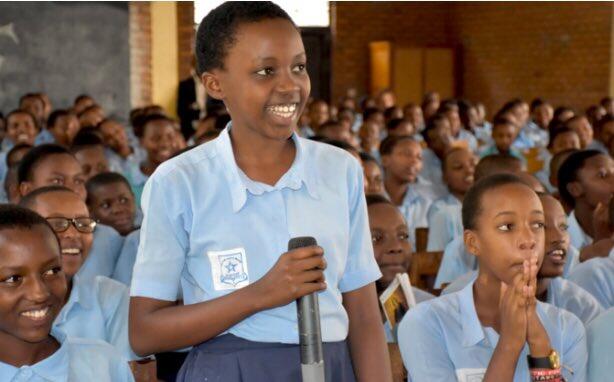Embracing the hopes and dreams of millions of girls for a gender-equal world
Every year, millions of girls are subjected to practices that harm them physically and emotionally, sometimes with the full knowledge of their families, friends and communities, according to the State of World Population 2020, released by UNFPA on 30th June.
Child defilement is a crime and an outright violation of a girl child’s rights. It is a multidimensional problem with far-reaching consequences. It inflicts trauma and pain to the innocent children which in return, even with future investments, will be affected negatively with implications on health, education, economy and socially. Thus its prevention requires an investment of resources, leadership, and joint commitment of all stakeholders.
The Government of Rwanda, through the Ministry of Gender and Family promotion has been working with its partners to promote and safeguard children's rights. For the best interests of the child, the right to life, survival and development; and the right to protection; various laws and policies protecting child's rights, anti GBV law, law governing persons and families and the penal code were drafted and amended.
According to the Rwanda Investigation Bureau report, there was an upward increase of 27.9% (876 cases) of investigated cases when comparing data from 2018-2019 and 2019-2020 fiscal year (3,137 to 4,013 respectively). The same report states that victims of child defilement slightly increased from 3,215 victims in 2019 to 4,265 in 2020. Counting 1,239 (29.1%) of victims under 10 years old in 2020. 98% of these cases are girls.
Girls remain the main victims of these harmful practices, and unfortunately they continue to be silenced and unable to enjoy their rights.
Across the East and Southern Africa Region and throughout history, girls’ voices tend to get muffled, not just at home but in communities, schools and the public sphere. From their voices to their rights, girls are subjected to harmful practices that scar their young minds and bodies and set back their chances of a bright future.
UNFPA calls attention to the vulnerabilities and needs of women and girls especially during the COVID-19 crisis, and to why protecting sexual and reproductive health and rights and ending gender-based violence is an imperative, especially in these challenging times.
“UNFPA works to guarantee a world where every young person’s potential is fulfilled. There is no better time than now for each and every one of us to put on that protective mantle and ensure that we all play a role in investing in and putting young girls first.” Said The UNFPA Regional Director Dr. Julitta Onabanjo in her statement.
This year, on 11 October, the International Day of Girl Child, the Ministry of Gender and Family Promotion (MIGEPROF) through the National Commission for Children (NCC) launched a 1-year national campaign against Child defilement under the theme “My Voice-My rights against sexual abuse”.
Officially launched by H.E. the First Lady of the Republic of Rwanda, Mrs. Jeannette Kagame, the campaign aims at bringing together key stakeholders to rethink and recommit to innovative strategies that can be used to fight against child defilement at community level and will include different activities such as supporting the victims and putting more efforts in areas with more cases of child abuse by educating and informing the community.
“Today, we can not only celebrate our girls and forget to discuss and tackle problems they face including child defilement” said H.E. Mrs Jeannette Kagame in her opening remarks. “This is not our first campaign, and we will not retire.” She added.
Defilement remains an unspoken taboo and actions barely reach everyone. If it continues, the consequence will be immeasurable, at all levels from ground to national level, especially to the future generation.
“Today, we need to sit and ask ourselves where we are heading if the problem persists. When you look at all that has been done, you wonder the root cause of why the crime of child abuse isn’t eliminated completely. You can even start thinking how diverse humans are, when you see what has happened when a parent abuses a child.”: H.E. Mrs Jeannette Kagame
It is a noble aspiration to create a gender-equal world by 2030, one that can become a reality. Only in such a world will girls be empowered to realize their dreams, and to tell the stories of their achievements for generations to come.
Since gender equality has enabled Rwanda to progress in many ways, parents should now come out and play their role in child protection, starting with men. The role of men is very crucial.
"Men and boys must be part of the solution. As men, we need to step-up and use our privilege to raise the value of girls and women. We must demand equal treatment." Stated Mr. Mark Bryan Schreiner, UNFPA Rwanda Representative.
“The change must happen among adult parents in community who don’t care about treating every child as their own, thus a community shortfall in protecting potential victims of abuse.” Said Alodie Octavie Akoyiremeye, the president of Rwanda national children forum.
Let us collectively take a moment to listen to and hear the voices of our girls as they speak of their dreams and aspirations, and do our best to uphold their rights and choices. We owe them the right to be positive and determined about the future and to be able to make their aspirations a reality.


